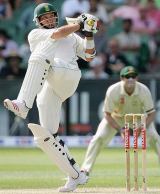The enigma called Jacques Kallis
He has played almost 100 Tests, averages nearly 57, has scored runs against allcomers in all conditions, and was recently named the ICC's Player of the Year, but Jacques Kallis has hardly got the kind of acclaim you'd expect a batsman to receive after all
|
|

|
In eight Tests against Zimbabwe and Bangladesh, Kallis has scored 893 runs and has been dismissed just four times, giving him an incredible average of 223.25. In 14 Tests against Australia (before the current Sydney Test), on the other hand, Kallis's returns were a far more modest 800 runs at 33.33 before the last Test of the 2005-06 series against Australia at Sydney. Against Pakistan, another side with a strong bowling attack, he has only managed 38 runs per innings in eight matches. Against Muttiah Muralitharan's Sri Lanka, the average is a dismal 33.63.
| Versus | Before Apr '01-Tests/ runs | Average | After Apr '01-Tests/ runs | Average |
|---|---|---|---|---|
| Australia | 6/ 256 | 23.27 | 9/ 705 | 50.36 |
| England | 12/ 599 | 39.93 | 8/ 183 | 54.20 |
| India | 2/ 136 | 68.00 | 4/ 443 | 88.60 |
| New Zealand | 6/ 463 | 66.14 | 3/ 354 | 70.80 |
| Pakistan | 4/ 220 | 66.14 | 4/ 236 | 39.33 |
| Sri Lanka | 8/ 347 | 26.69 | 4/ 292 | 48.67 |
| West Indies | 8/ 649 | 49.92 | 10/ 1207 | 109.73 |
| Zimbabwe | 2/ 179 | 89.50 | 4/ 500 | 250.00 |
| Bangladesh | - | - | 2/ 214 | - |
It's an allegation that has much more merit, but one that is tougher to either prove or disprove through numbers alone. It's difficult to look at the scorecards and say, for instance, if an 83 off 165 balls was just the innings for the occasion, or if it spoilt the team's chances of gunning for victory. For people who have watched him over the years, though, his approach has often been baffling: despite having almost every stroke at his command - to go with a watertight defensive technique - Kallis seldom dominates bowling attacks the way he should. The innings at Sydney was only the latest example of how he seems to bat in a bubble, oblivious to the team cause - less than a couple of months earlier, Kallis plodded his way to 91 off 146 balls in an ODI against India at Mumbai, as South Africa only managed 221 and ended up losing the match.
| Not-out innings | Runs | |
|---|---|---|
| Steve Waugh | 46 | 3337 |
| Allan Border | 44 | 2989 |
| Jacques Kallis | 28 | 2227 |
| Sachin Tendulkar | 21 | 1957 |
| Garry Sobers | 21 | 1908 |
| Not-outs in 2nd innings | Runs | |
|---|---|---|
| Allan Border | 31 | 1842 |
| Jacques Kallis | 21 | 1310 |
| Geoff Boycott | 20 | 1270 |
| Graham Thorpe | 23 | 1188 |
| David Gower | 15 | 1087 |
S Rajesh is stats editor of Cricinfo. For some of the stats he was helped by Arun Gopalakrishnan in the Chennai office.